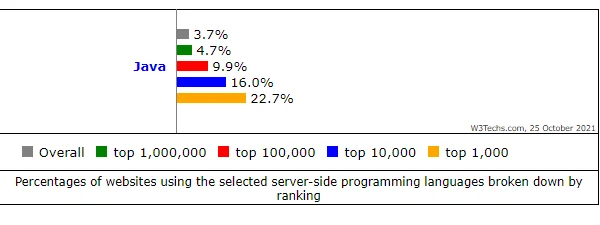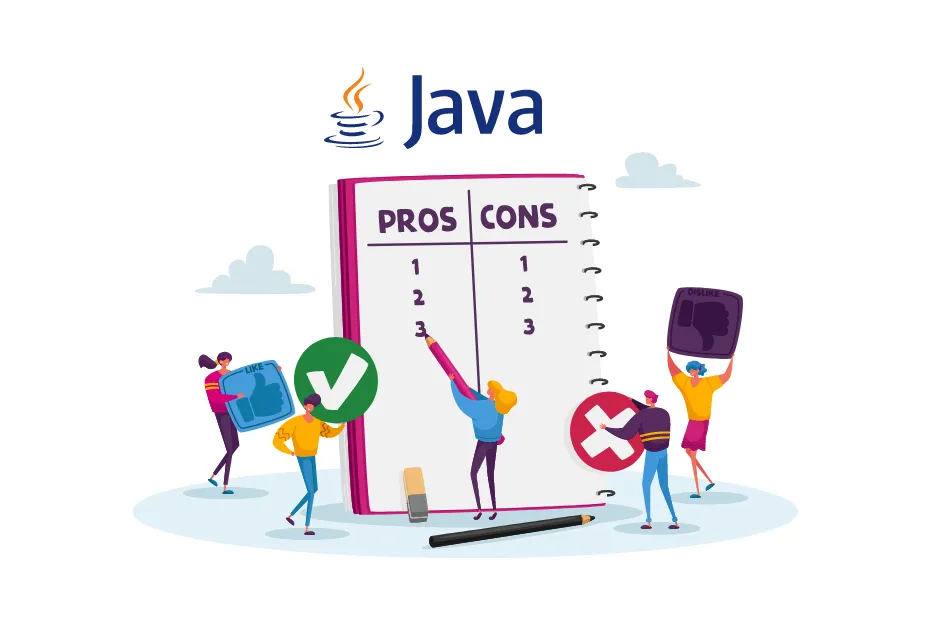Do you know that Java is the backbone of over 3 billion devices worldwide?
Yes, you read that right. In the dynamic realm of software development, Java stands as an unwavering giant, steering the course of innovation and shaping our digital world.
But what makes Java so pivotal in the grand scheme of software development? What are the real-world applications that make it indispensable?
In this crucial analysis, we will delve deep into the significance of Java, uncovering its profound influence on everything from mobile apps and web development to enterprise systems.
Armed with compelling statistics, we’ll explore how Java remains the most sought-after programming language, defying the tides of time.
Join us as we unravel the layers of this programming marvel and discover why Java continues to reign supreme.
Some Latest Stats on Java Programming Language:
As per w3techs.com, Java is used by 3.7% of all the overall websites and 4.7% of all the websites that rank in the top 1,000,000.
Img src: w3techs
-> The current market position of the Java programming language is shown below:
- As per the Tiobe Index report, Java ranked at 2nd position, which later on was overtaken by Python.
- As per Statista, nearly 56% of respondents say that they use Java, Python, SQL, and HTML/CSS as the top 5 programming languages around the globe.
How will Java software development be good for businesses in 2024?
Java, a versatile programming language, prioritizes code readability and has become a cornerstone of modern business.
With its open-source nature and cross-platform compatibility, Java has emerged as a preferred language for enterprises. Unlike some languages like Python, which are limited to console applications, Java offers the flexibility to run GUI and console programs.
Java’s adaptability is remarkable; it can operate on Microsoft Windows, Mac OS X, Android OS (via a virtual machine), Blackberry OS 10, and various Linux distributions using the OpenJDK JVM. It extends to platforms like Palm WebOS and the Google Chrome browser plugin.
For businesses, time and cost-efficiency are paramount. Java web development plays a pivotal role in minimizing coding errors. This ensures a smoother app development process, eliminating bugs and financial waste concerns.
Java’s universality is a game-changer for businesses aiming to streamline their software development projects.
Harness Java's versatility for standout applications.
Why is Java used for software development?
Java has been among the most demanding programming languages over the past few decades.
Let’s look at why Java app development will remain an important part of any software developer’s toolkit in the future.
1) Java Web Application Development
- Global Connectivity: Java web development was pivotal in establishing a global network of interconnected computers communicating seamlessly.
- Server-Side Dominance: Even today, Java is one of the most favored programming languages for crafting server-side applications.
- Diverse Options: While Java excels, it’s not the exclusive choice. A multitude of programming languages and frameworks exist to develop web applications.
- Key Advantages: Among the myriad reasons to opt for Java, three stand out: flexibility, power, and security.
2) Java App Development
- Pure Object-Oriented Language: Java is a pure object-oriented programming language, distinguishing it from others where object-oriented concepts are secondary. From its inception, Java was designed with object-oriented principles in mind.
- Bytecode Compilation: When you write code in Java, it undergoes compilation into bytecode. This bytecode is executed by a virtual machine, the JVM (Java Virtual Machine), instead of direct interpretation at runtime.
- JVM Compatibility: The JVM can execute code written in Java or other JVM-compliant languages, such as Scala and Clojure. This compatibility opens doors for advanced development projects, especially those focused on performance optimization.
- Language Interchangeability: Java app development isn’t limited to Java alone. Languages like Scala and Clojure, which compile to run on the JVM, can be seamlessly integrated into Java projects. This flexibility contrasts languages like Python, making it easier to switch between multiple languages if needed.
Also Read: 7 Java Web Development Technologies You Must Know
3) Java Mobile App Development
- Open-Source Stalwart: Java, an open-source programming language, originated from the creative minds at Sun Microsystems in 1995.
- Global Impact: In the present day, Java serves as the driving force behind a diverse spectrum of applications and websites across the globe.
- Versatile: Its versatility is evident, from fueling the engines of renowned social platforms like Twitter and LinkedIn to optimizing the efficiency of enterprise software, aiding businesses in their operations.
Pros & Cons

The pros of Java:
- Java has been around since 1995, so it’s been tested thoroughly over the decades with billions of lines of code written in it.
- The framework is extremely object-oriented — each component is encapsulated in its own class and has to communicate with the other components only through their public interface.
- You can start learning Java easily since it’s clear what you should do when programming — no hidden traps are waiting for you.
- The code developers write using Java is compiled into bytecode that runs on any Java Virtual Machine (JVM) and can be executed across different platforms.
The cons of Java:
- The language is very verbose; every line of code you write has to contain much information, making it less readable than other languages like Python or JavaScript.
- It’s old and not as dynamic; learning, developing, and debugging is hard. It has an extensive syntax that takes developers a long time to learn how to use it efficiently.
- The Java code is compiled into bytecode before running on the JVM — this means you need the full Java SDK installed in your machine for any Java-related task to run properly.
Step into the future with Java's advanced capabilities.
Why is Java a preferred choice by software developers?
Produce highly scalable apps:
- Java ranks among the top choices for web app development.
- Java is the core for Android software development, supported by tools like IntelliJ IDEA and Eclipse IDE.
- Java’s role extends to data science and machine learning, increasingly sought after by companies seeking advanced automation.
- Known for scalability, Java offers robust high-level concurrency tools and packages, making it ideal for large solutions.
- Java’s cross-platform compatibility ensures seamless use across diverse devices and systems.
- Java originated in facilitating remote collaboration and harnessing networked environments for efficient programming.
Consists of a variety of APIs:
- Java offers a range of APIs, each granting developers access to various methods and tools for application development.
- These APIs eliminate the need for numerous separate libraries, streamlining tasks like networking, XML data processing, and database connectivity all in one go.
- Beyond the core APIs, additional libraries like Google Guava, Apache Xerces, and GSON enhance application functionality.
- As exemplified by Apache Xerces and GSON, open-source software continually improves app performance.
- Many companies release public APIs, providing programmers access to their data and services. For instance, Twitter’s API allows developers to harness its resources.
Also read: Importance Of Java For Software Development & Its Applications
Provides a robust community:
- Over the last decade, Java has been a computing constant.
- Java’s strength lies in its dynamic and thriving community support, setting it apart from languages like C or Pascal.
- Java excels as a beginner-friendly language, offering an array of features for newcomers.
- Java developers can easily find answers on platforms like Stack Overflow, making it feel limitless in possibilities, unlike some perceived limitations in other languages.
Has a great documentation:
- Java documentation caters to all your needs whether you’re a revolutionary app builder or a coding enthusiast.
- Access step-by-step tutorials, including guides on project creation with NetBeans IDE.
- Explore API docs for secure online interactions, like OktaAuth (OAuth 2) for browser plugins.
- Developer guides offer valuable insights and lessons learned throughout the development journey, providing a well-organized resource.
Accompanied by powerful development tools:
- Java provides an extensive array of tools, from automated to manual.
- NetBeans, a widely-used IDE, simplifies Java app development. It supports Maven and ANT scripts for dynamic build management.
- NetBeans offers robust debugging capabilities, including VisualVM, for efficient Heap utilization monitoring without impacting program performance
Java is a versatile and potent programming language. It offers advanced GUI systems, surpassing AWT and Swing.
With JAVA DB, Java enables seamless database connection. You can store data globally via cloud services like Amazon Web Services.
Explore the transformative power of Java development.
Applications of Java
Every big organisation is using Java for building valuable applications. In fact, there are approx. 64,000 companies using JAVA in the U.S. alone. Here, we will find its major applications:
Enterprise Apps
Java is the most popular enterprise application development language because it has robust features that match current industry needs. Most companies in today’s era use Java applications, and they do so for their security plus power as well as scalability with extraordinary performance rates.
Examples:
- ERP solutions
- CRM solutions
- Business Apps
- Government Apps
- Charity Apps
Also read: Java 10: New Features And Enhancements
Web-based Java Apps
A web application is a client-server program that uses the Internet to interact with users. Java supports developing these applications through servlets, struts, and traditional programming languages like C# or VB .NET, which all work well with your website’s server-side code.
Examples:
- Online Forms
- Google Slides
- Gmail
- Google Sheets
- Shopping carts
Cloud-based Java Apps
Despite being the language that provides a structure for web applications, Java has recently been breaking into cloud-based development because of its distributed nature.
In this context, it offers features that can be used from SaaS (Software as service), IaaS(Infrastructure as a Service), and PaaS Platforms such as Amazon Web Services’ Lambda services or OpenPop by HPE.
Examples: (Tools)
- Google app engine
- Jelastic
- IBM SmartCloud
- AWS SDK
- Cloud Foundry
Choose Java for unparalleled software performance.
Java Mobile Apps
In today’s era, most phones and smart devices have Android OS. Without Java, creating an app for these platforms is impossible. As a result, most apps are developed in Java Micro Edition (J2ME).
Fortunately, there’s also Kotlin, which can help us create apps compatible with Android Studio and Google Play Services. Hence, they’re far easier (and less expensive) than if we did everything from scratch every time our mood changed.
Examples:
- Netflix
- Google Earth
- Uber
- QRReader
- Tinder
GUI Java Apps
With the help of APIs like AWT and Swing, you can develop desktop applications in Java. The Abstract Windowing Toolkit (AWT) is an interface designed to easily develop window-based programs that will not require specialized knowledge about programming languages or design principles.
Examples:
- Media Player
- ThinkFree
- Acrobat Reader
- Antiviruses
Also read: How Good Is Java For Your Web Application Development?
Conclusion:
Java has become the foremost choice for software developers worldwide, especially within the software development company realm.
Java is the catalyst for building thriving businesses. At ValueCoders, we’re your trusted partner in crafting bespoke software solutions. From start to finish, we’ve got you covered.
If you have more to share about Java applications or are ready to embark on your Java development journey, don’t hesitate to contact us at ValueCoders or drop your thoughts in the comments below. Your next big software project begins here.








